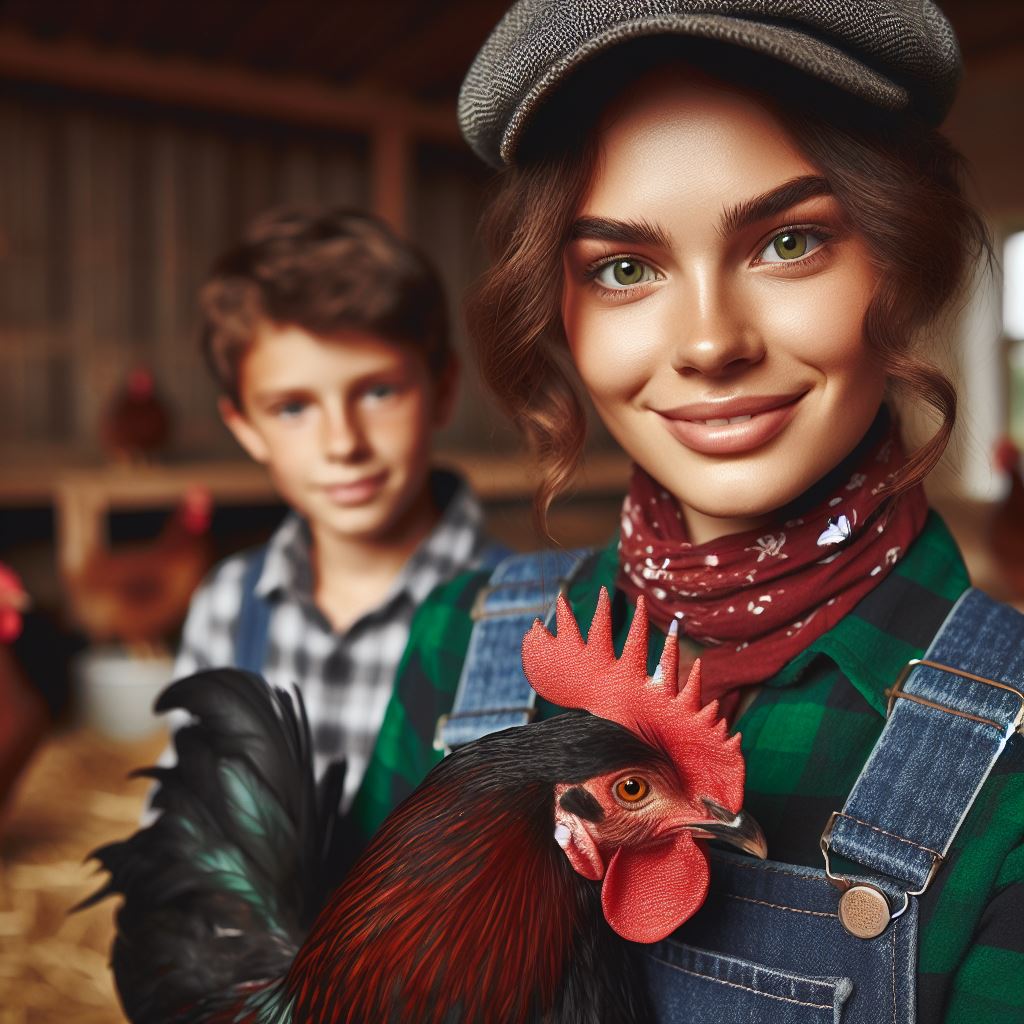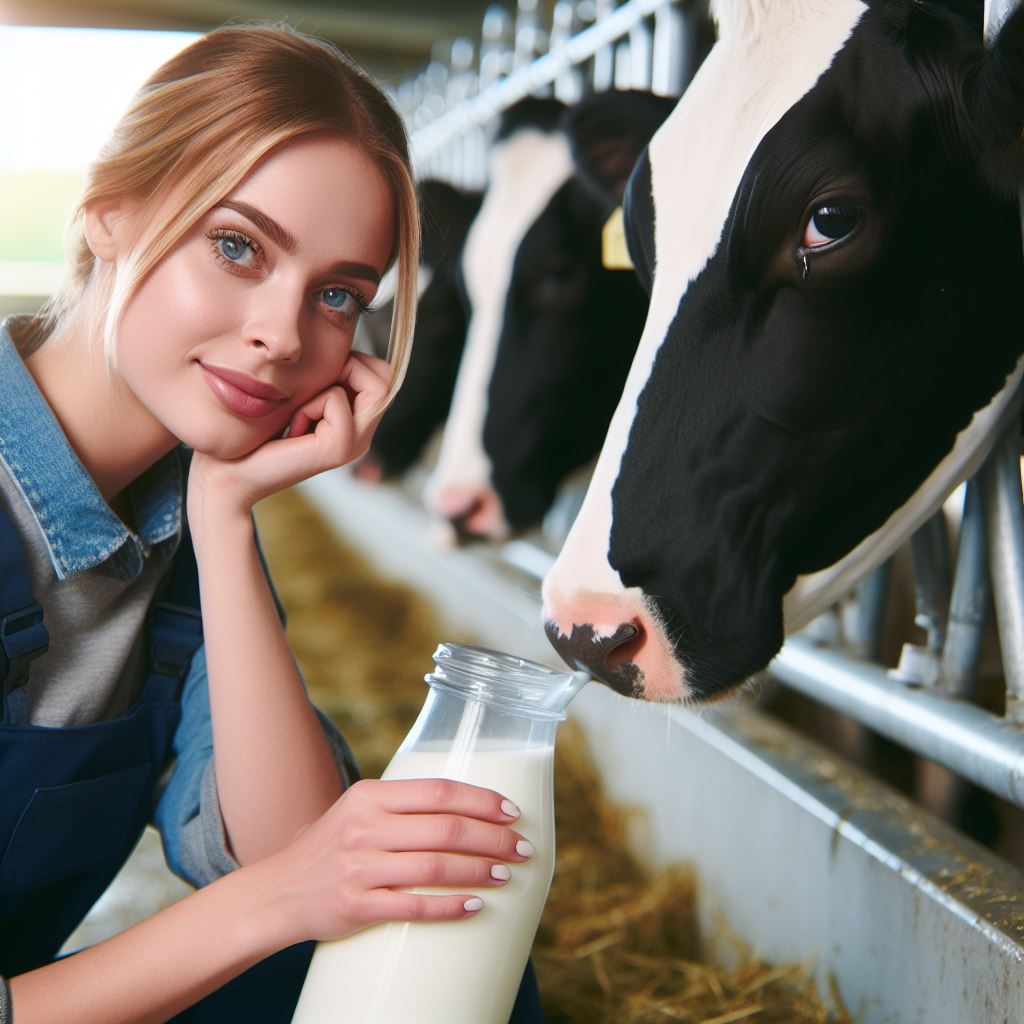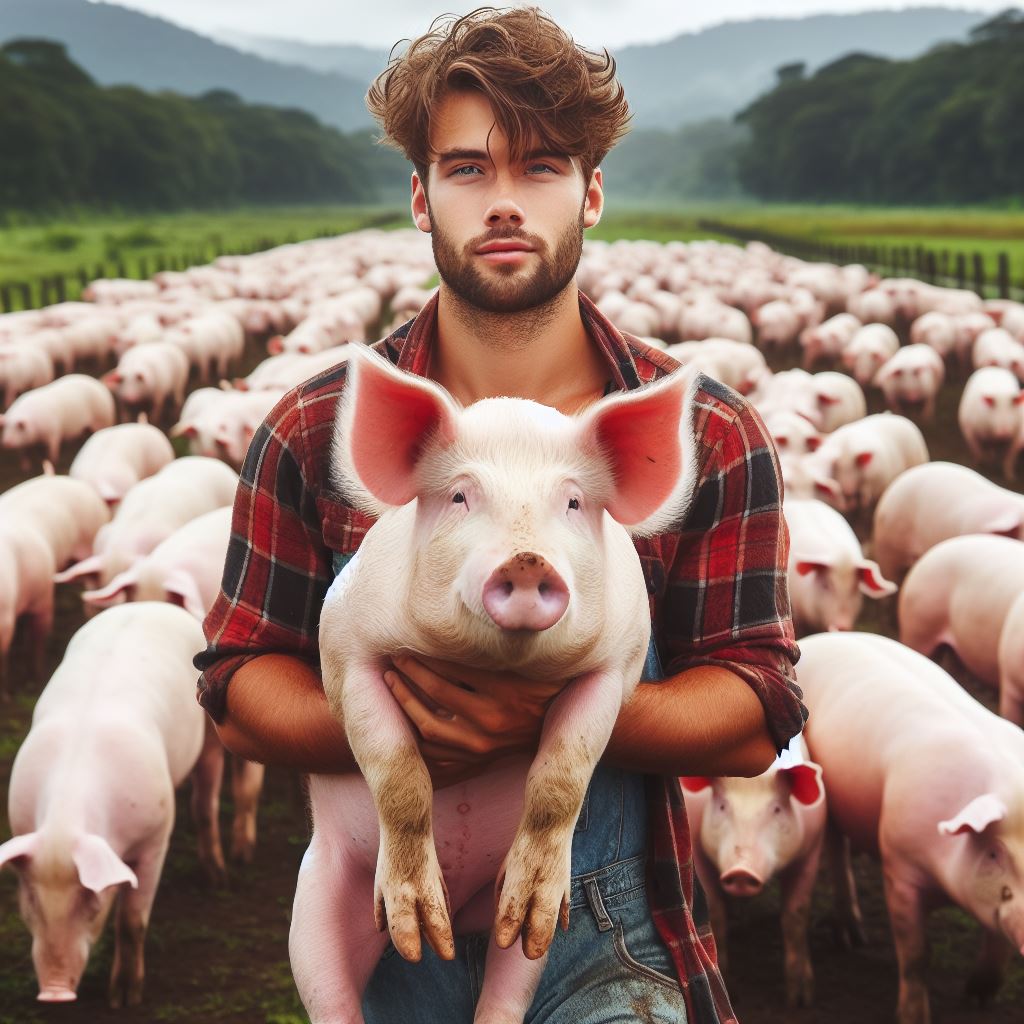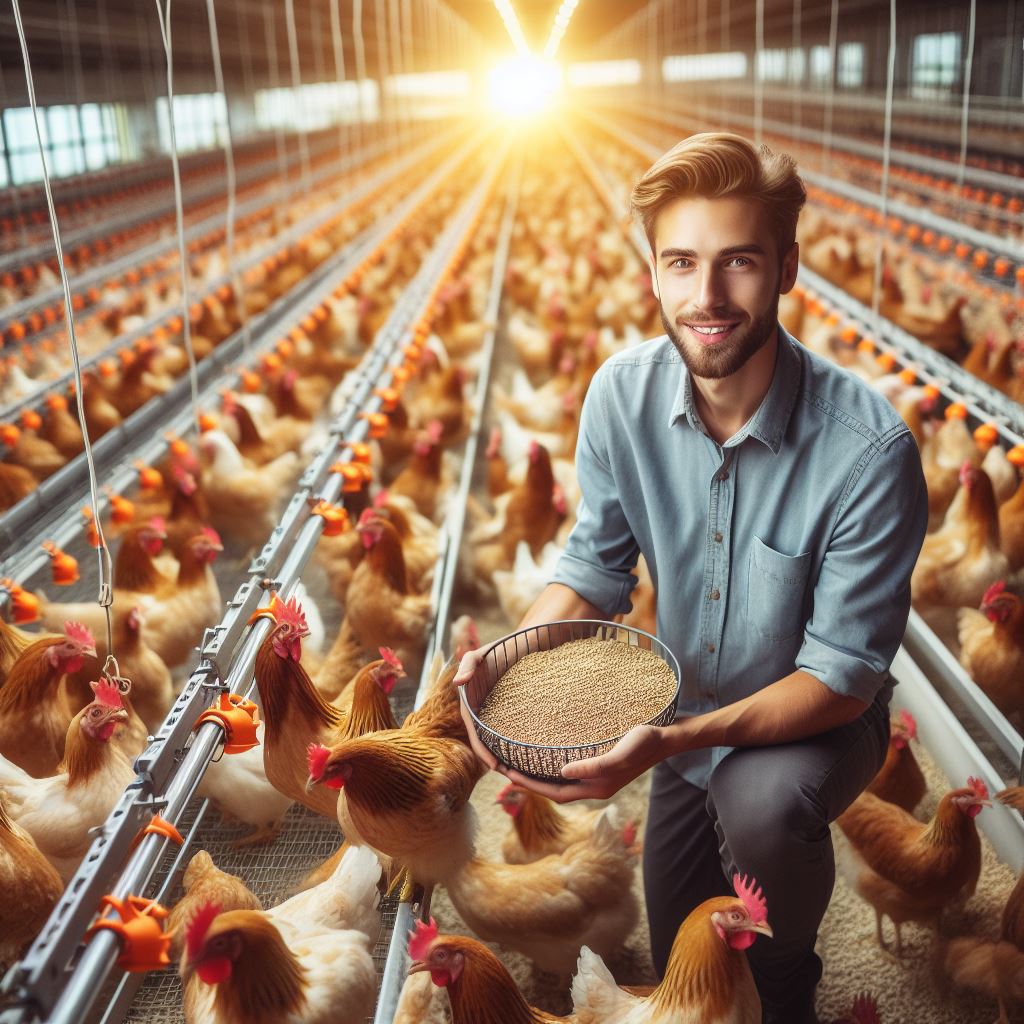Introduction
Let’s explore Poultry Chickens Genetics.
- Genetic Significance: Poultry genetics is pivotal for cultivating robust, high-performing chicken breeds.
- Importance of Selection: Through strategic selection, desirable traits like disease resistance and egg production are prioritized.
- Innovations in Breeding: Modern advancements include genetic markers and technologies that expedite selective breeding for excellence.
- Impact on Productivity: Superior genetics directly influence the efficiency of meat and egg production, vital for poultry farming success.
- Focus on Health: Genetic considerations extend to disease resistance, promoting overall flock health and minimizing antibiotic reliance.
- Tailoring Breeds: Understanding genetic principles enables farmers to tailor breeds that thrive in specific environments and meet market demands.
Embark on a journey into the intricate world of poultry genetics, where science meets agriculture to enhance your flock.
Understanding Poultry Genetics
Define poultry genetics and its branches such as quantitative genetics and molecular genetics
What is Poultry Genetics?
Poultry genetics refers to the study of how genetic traits are passed down from one generation of chickens to the next.
It involves understanding the role of genes and how they influence various aspects of poultry, including their physical characteristics, behavior, and disease resistance.
Branches of Poultry Genetics
- Quantitative Genetics: This branch focuses on measuring and analyzing the genetic components that contribute to quantitative traits, such as body weight, egg production, and growth rate.
- Molecular Genetics: This branch delves into the structure and function of genes at the molecular level, using techniques like DNA sequencing and gene expression analysis to study specific genetic traits.
Discuss how genetics influence physical characteristics, behavior, and disease resistance in chickens
The Influence of Genetics on Physical Characteristics
Genetics play a crucial role in determining the physical appearance of chickens.
These genetic factors include feather color, comb type, beak shape, and body size.
Breeders can selectively breed birds with desirable physical traits to create new varieties and improve the overall quality of poultry breeds.
The Influence of Genetics on Behavior
Genetics also have a significant impact on chicken behavior.
Some breeds are genetically inclined to be docile and friendly, while others may exhibit more aggressive or flighty behaviors.
These behavioral traits are inherited and can be selectively bred to develop poultry breeds with desired temperaments.
The Influence of Genetics on Disease Resistance
Genetic factors play a crucial role in determining the disease resistance of chickens.
Certain genetic variations can make birds more resilient to specific diseases, while others may make them more susceptible.
Breeders can select for disease-resistant traits to improve the overall health and productivity of their flocks.
The Role of Genetic Selection in Poultry Breeding
Genetic selection is a fundamental tool in poultry breeding that allows breeders to choose and favor certain traits in the breeding stock to achieve desired outcomes.
Through careful selection, breeders can improve the overall performance and quality of poultry flocks.
Transform Your Agribusiness
Unlock your farm's potential with expert advice tailored to your needs. Get actionable steps that drive real results.
Get StartedSelective Breeding for Desired Traits
When selecting breeding stock, breeders look for specific traits that align with their breeding goals.
These traits may include egg production, meat quality, growth rate, or disease resistance.
By choosing birds with superior traits for reproduction, breeders can enhance those traits in subsequent generations.
Genetic Evaluation and Breeding Value
Genetic evaluation plays a crucial role in understanding the potential breeding value of individual chickens.
Breeding value is a measure of an individual’s genetic merit and their potential to pass on desirable traits to their offspring.
It helps breeders make informed decisions on which birds to select as breeding stock.
Breeding Programs and Genetic Diversity
While selective breeding aims to improve specific traits, it is also essential to maintain genetic diversity within poultry populations.
Genetic diversity helps ensure the long-term viability and adaptability of chicken breeds.
Breeders carefully plan breeding programs to balance genetic improvement with preserving genetic variation.
The Impact of Technology on Poultry Genetics
Technological advancements in molecular genetics, such as DNA sequencing and marker-assisted selection, have revolutionized poultry breeding.
These tools enable breeders to identify and select for specific genetic traits more efficiently, resulting in faster and more precise genetic improvement.
Therefore, understanding poultry genetics is essential for breeders to raise superior chickens.
By comprehending how genetics influence physical characteristics, behavior, and disease resistance, breeders can make informed decisions in selecting breeding stock and implementing breeding programs.
Continuous advancements in genetic research and technology will further enhance poultry breeding and contribute to the sustainable development of chicken breeds.
Read: Essential Pig Nutrition for Growth
Choosing Superior Breeds for Poultry Production
When it comes to poultry production, selecting the right breed is of utmost importance.
The specific purpose of the poultry farm, whether it is egg production, meat production, or dual-purpose, determines the breed that should be chosen.
Importance of Selecting the Right Breed
The right breed can make a significant difference in the success and profitability of a poultry farm.
Each breed has distinct characteristics that make it more suitable for certain purposes.
For egg production, certain breeds are known for their exceptional performance in laying eggs.
These breeds tend to have larger and more productive egg-laying capabilities compared to others.
They are highly sought after by poultry farmers focused on egg production, as they can maximize yield and meet market demands.
On the other hand, for meat production, some breeds have been selectively bred to have larger sizes and quicker growth rates.
These breeds are known for their high meat yields and efficient conversion of feed into meat.
Showcase Your Farming Business
Publish your professional farming services profile on our blog for a one-time fee of $200 and reach a dedicated audience of farmers and agribusiness owners.
Publish Your ProfileThey are preferred by farmers in the meat industry who aim for faster growth and higher meat quality.
For those who want a balance between egg and meat production, dual-purpose breeds are ideal.
These breeds possess a combination of traits that make them suitable for both purposes.
They lay a decent number of eggs while also having good meat characteristics.
Dual-purpose breeds are popular among small-scale farmers who want to meet their household needs.
Popular Superior Breeds
Several superior breeds have gained popularity in the poultry industry due to their desirable traits.
These breeds have been developed through careful selection and breeding to enhance specific characteristics.
One such breed is the Rhode Island Red.
It is renowned for its excellent egg-laying abilities, producing brown eggs at a consistent rate.
The Sussex breed is another popular choice for its versatility as a meat and egg producer.
It has a calm temperament and adapts well to various climates.
Another well-known breed is the Leghorn, which excels in egg production.
It is highly efficient, converting feed into eggs with remarkable productivity.
The Cornish Cross, also known as the Cornish-Rock, is a common breed used for meat production due to its rapid growth and substantial meat yield.
Evaluating Breed Standards and Selecting the Most Suitable Breed
When selecting a breed for a specific poultry farm, it is vital to evaluate breed standards and characteristics.
Breed standards outline the ideal traits and physical attributes that a breed should possess.
Considerations such as adaptability to local climates, disease resistance, temperament, and growth rates should be taken into account.
Farmers should also assess the market demand and preferences to ensure the chosen breed aligns with the potential customer base.
To evaluate breed standards, farmers can consult poultry breed associations, experts, and existing poultry farmers.
These resources provide valuable insights and practical advice on selecting the most suitable breed for a specific purpose.
Most importantly, choosing the right breed is crucial for successful poultry production.
Each purpose, whether it’s egg production, meat production, or both, requires a different breed with specific traits.
Understanding breed standards and consulting experts can help farmers make informed decisions and raise superior chickens for their poultry farms.
Read: Effective Pig Housing Solutions

Genetic Selection Methods in Poultry Breeding
Traditional Breeding Methods
Selecting superior genetics in poultry breeding involves a careful process.
Here, breeders evaluate the performance of individual birds based on specific traits, such as growth rate, egg production, and disease resistance.
Only birds with the desired traits are chosen as parents for the next generation, ensuring those traits are passed on.
This method allows breeders to gradually improve the overall characteristics of the flock over time.
Hybrid Vigor in Poultry Breeding
Hybrid vigor, also known as heterosis, refers to the increased performance of offspring resulting from crossbreeding two different purebred lines.
When two purebred lines with complementary traits are crossed, the offspring often exhibit an enhanced combination of these traits.
For example, crossing a breed known for its egg-laying ability with a breed known for its meat quality may result in offspring with high egg production and excellent meat characteristics.
This increased performance can lead to more efficient production and improved profitability for poultry producers.
Modern Genetic Selection Methods
Advancements in technology have revolutionized the process of genetic selection in poultry breeding.
Marker-assisted selection (MAS) involves identifying and selecting birds based on specific genetic markers associated with desirable traits.
These markers are markers are snippets of DNA that are correlated with certain characteristics.
Breeders can use this information to make early selections, reducing the time it takes to breed birds with desired traits.
Genomic selection (GS) is another modern method that utilizes high-throughput DNA sequencing to evaluate an animal’s entire genome.
This method analyzes the genetic variants in an animal’s DNA to predict its overall genetic merit.
Breeders can select birds with the highest genetic potential for desired traits, even if those traits are difficult to measure directly.
Genomic selection allows for more accurate predictions and faster genetic progress in poultry populations.
Showcase Your Farming Business
Publish your professional farming services profile on our blog for a one-time fee of $200 and reach a dedicated audience of farmers and agribusiness owners.
Publish Your ProfileIn the end, genetic selection plays a crucial role in poultry breeding to produce superior chickens.
Traditional breeding methods focus on evaluating individual birds based on specific traits, gradually improving the flock over time.
Hybrid vigor, resulting from crossbreeding, enhances the performance of offspring.
Moreover, advancements in technology have introduced marker-assisted selection and genomic selection, allowing breeders to make precise and efficient selections based on genetic markers and an animal’s entire genome.
These modern methods speed up the breeding process and result in improved poultry populations.
Read: Poultry Farming: Dealing with Predators
Breed Improvement and Genetic Management
Importance of Continuous Breed Improvement through Proper Genetic Management
- Breed improvement is crucial for raising superior chickens and ensuring the long-term success of a poultry flock.
- Proper genetic management allows breeders to select and propagate the best individuals with desirable traits.
- Continuous improvement ensures that future generations possess superior qualities, such as disease resistance and growth rate.
- Through genetic management, breeders can enhance traits like egg production, meat quality, and feather color.
- Without proactive breed improvement, poultry flocks can stagnate, jeopardizing their competitiveness in the market.
Concept of Inbreeding Depression and the Need for Genetic Diversity
- Inbreeding depression refers to a decline in vigor and fertility caused by mating closely related individuals within a flock.
- When inbreeding occurs, deleterious recessive genes are more likely to be expressed, leading to reduced fitness in offspring.
- Genetic diversity is crucial in countering inbreeding depression, as it introduces a wider range of genetic material.
- High levels of genetic diversity help maintain a healthy balance of traits and increase overall flock resilience.
- Without genetic diversity, poultry flocks become more vulnerable to diseases, environmental stress, and other challenges.
Strategies for Maintaining Genetic Diversity in a Poultry Flock
- Regularly introduce new genetics from unrelated, high-quality individuals to enhance genetic diversity.
- Practice rotational breeding, which involves breeding individuals from different bloodlines in successive generations.
- Implement crossbreeding programs using carefully selected breeds to introduce new traits and increase genetic variation.
- Perform periodic genetic analyses to assess the level of diversity within the flock and take corrective measures if necessary.
- Enact breeding policies that discourage inbreeding and promote outcrossing to prevent excessive genetic similarity within the flock.
- Collaborate with other breeders to exchange genetic material, ensuring genetic diversity between flocks.
Essentially, continuous breed improvement through genetic management is vital for raising superior chickens.
Inbreeding depression can significantly impact flock health and performance, emphasizing the need for genetic diversity.
By implementing various strategies such as rotational breeding, crossbreeding, and regular introduction of new genetics, breeders can maintain and enhance genetic diversity within their poultry flocks.
With careful genetic management, poultry breeders can ensure the long-term success and competitiveness of their flocks in the industry.
Read: Bee Genetics: Strengthening Your Hive
Conclusion
To raise superior chickens, poultry genetics plays a crucial role.
Genetic selection, breed choice, and genetic management are all important factors in achieving desired traits.
Understanding and implementing these techniques can lead to better poultry production.
By carefully selecting and breeding chickens with desirable traits, poultry farmers can improve characteristics such as growth rate, meat quality, and disease resistance.
This can ultimately lead to more profitable and sustainable poultry production.
Furthermore, genetic management techniques such as inbreeding and outcrossing can be used to maintain and enhance desired genetic traits in chicken populations.
Proper genetic management ensures that superior traits are preserved and passed down through generations of chickens.
It is important for readers to further explore the field of poultry genetics as it offers valuable insights and techniques for improving poultry production.
Learning about the latest advancements in genetics can help farmers make informed decisions and adopt practices that will maximize their productivity and profitability.
In general, poultry genetics is a key component in raising superior chickens.
Genetic selection, breed choice, and genetic management are vital in achieving desired traits and improving poultry production.
By delving deeper into the field of poultry genetics, farmers can stay ahead of the game and optimize their chicken rearing efforts.




